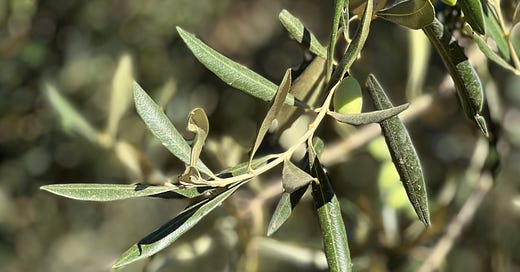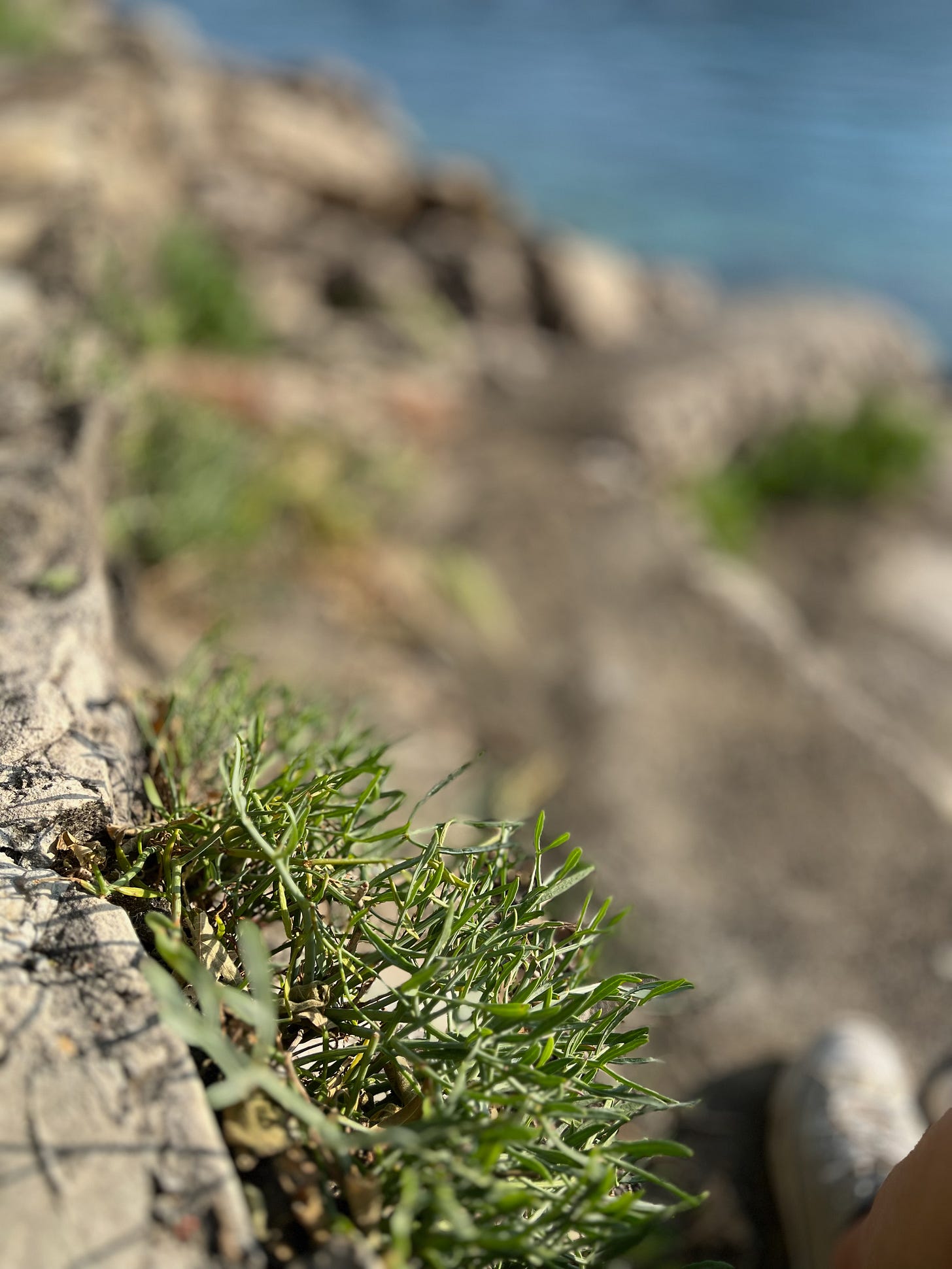In my first post, I mentioned how this project (writing about food in the time of war) had many starts and stops. Today is one of those days.
Weak with anger, numb from PTSD, speechless in the face of new horrors, I withdraw. And I stop writing.
Yes, there are beautiful things around me. But the news, gathered from reliable sources, halts me in my tracks. This happens every time a new war begins, an old one escalates or yet another aggression unfolds.
Some Sad Facts
As I write this, the situation in Gaza grows more dire by the minute. Food is so scarce that people, many among them children, are dying of starvation. Sufficient humanitarian aid hasn’t entered Gaza in months. Israel continues to bomb, to kill, to starve. The world leaders jet-set and issue carefully worded reproaches: this side, then that, all while refusing to act.
In other parts of the world, civilians are also being targeted. The rhetoric is always similar. And the climate crisis, which urgently needs our attention, only exacerbates hunger further.
The World Food Programme lists a long roster of emergencies:
Afghanistan, Central Sahel, Democratic Republic of Congo, Ethiopia, Haiti, Lebanon, Mozambique, Myanmar, North Eastern Nigeria, Palestine, Somalia, Southern Africa (drought), South Sudan, Syria, Ukraine, Yemen.
Over 343 million people are facing starvation. (That’s the entire population of the US.) And now Iran is being added to the list.
Meanwhile, dictators deploy propaganda to deflect from their own failings, doing everything to cling to power. Other global leaders, instead of finding the way to stop the killings and feed these starving millions (including those, even in wealthy countries, who go hungry because of poverty), invest in more weapons.
The toxic blend of capitalism, consumerism, colonialism, and, as some philosophers argue, modern feudalism, with greed as the binding agent, now rules the world.
What a travesty of humanity we have become.
But not all. Thankfully, not all.
We must persist in helping one another, as best we can: be kind, stay compassionate and hold onto the hope that goodness and justice will prevail. It won’t happen overnight. It may come too late for many. But still, I believe that someday perpetrators will be prosecuted and held accountable. It happened in the case of Bosnia, Rwanda and many others. It can happen again.
When Memory and the Present Meet
Watching the starvation and annihilation in Gaza, I feel a painful kinship.
We, too, lived without electricity, water and food. We, too, were targeted while waiting in lines for food rations, for bread, for water. Humiliated and terrified, we stood in line. We swore, prayed, sang, cracked jokes and kept standing. Because if you run away, you may still get killed on the way home. Or arrive empty-handed.
We, too, listened to lies: that bread and aid lines were targeted by our own (Bosnian) soldiers to elicit pity from the world.
When Sarajevo was under siege, our stories came through established media, still respected and trusted then. Writers came. Actors, journalists and activists came. UN peacekeepers, though neutral by mandate, were physically present. That may have made a difference in our survival.
That wasn’t the case with Srebrenica and some other towns in Bosnia, where even worse crimes of humanity were committed.
I cringe now, as I realise how naïve I was – giving interviews, smiling for cameras, having my children recite poetry or play the piano. I thought that if only we could show the world our humanity, how we were just like every other family anywhere in the world, then surely they (global leaders) would find a way to save us.
But the world wasn’t in a hurry.
It still isn’t.
What I also realise is this: the killings stop only when the interests of those watching on the sidelines, the wealthy nations, are aligned. The same fragile peace that could have been negotiated at the start is eventually brokered (after three, five, many years), and the victims become statistics. Meanwhile, the wealthy profit from investing in destroyed infrastructure or securing resources or territory they had long set their eyes on.
But Where Is the Food?
If you’ve read this far, you might ask yourself (or me): where is the food you promised to write about? It’s everywhere in this post, trust me. Because food is the opposite of hunger.
At least, in my mind.
Yes, this is one of those moments, when in the past I might have set this project aside and paused. Survivor’s guilt kicks in. How can I write about food, even war food, in a measured, almost sanitized manner when so many people are suffering right now.
Pain takes many forms. Every kind of suffering can be horrific, especially when it involves children. There are no comparisons. And if more people spoke or wrote about it, perhaps the chorus would be loud enough to silence the weapons. (Naïve again, I know.)
I still want to speak of beauty, especially the kind found in food, the kind that connects us and gives us hope.
Samphire, Sapphire, Motar, Mortar, and Apicius
I was in Korčula last week, the beautiful Island where, according to local legend, the great explorer Marko Polo was born. Dear friends, now living in Australia, return often to the ‘old country’ to visit family and friends. We had a wonderful time, as always. We sat in silence. We laughed. We talked. And, of course, we ate.
What caught my eye on the rocky beaches near their rented house was the proliferation of samphire and sea urchins, both delicious, both an acquired taste.
Years ago, in a novella (about war, yes) I wrote, I included a recipe for exotic birds translated from Apicius, the Roman cookery book. One of the ingredients was samphire. My editor kept changing it to sapphire. Cooking flamingo with crushed sapphire sounds decadently Roman, but it was wrong. After three rounds of corrections, I had to send him photos of samphire I’d taken in Dubrovnik the summer before. Eventually, the book went to print with the correct word.
I am not into gemstones of any kind. I’ll always take a handful of samphire over a sapphire.
In Croatian samphire is motar, a word dangerously close to the English “mortar”. I am fine with “mortar & pestle” reference, but not “mortar” as a weapon. I dislike weapons of any kind (let me be very clear about that), even the words for weapons. Words matter. So I always clarify: motar is samphire and has nothing to do with mortar, the instrument of war. Or sapphire, which may also cause conflict.
A Taste of the Sea
Samphire is an edible succulent that grows along salt marshes and beaches. It’s been foraged for centuries and used in coastal cuisines. In Europe, rock samphire, or Crithmum maritimum (to add a bit of Latin for the sake of Apicius), thrives on Mediterranean beaches and on British and Irish cliffs. It is not always easy to harvest. Shakespeare even noted its dangers in King Lear:
“Half-way down
Hangs one that gathers samphire; dreadful trade!”
[Act IV, Scene VI].
The word “samphire” derives from Saint Pierre (St. Peter), patron saint of fishermen. Rich in vitamin C and packed with antioxidants, samphire was used by mariners to prevent scurvy. It is also known as glasswort. In medieval times, it was burned to make soda ash for glassmaking.
Best enjoyed fresh, it pairs well with fish. Some chefs use it in meat dishes to cut through the fat. In Dubrovnik and elsewhere on the Adriatic coast, this crisp, salty sea vegetable is served raw in salads or pickled. It can also be steamed or sautéed with garlic and olive oil or butter. Its vernacular name is sea asparagus, sea bean, or sea fennel. I find the comparison to fennel the most fitting. Italians call it finocchio marino (sea fennel). And you have to trust Italians when food is in question.
As for the taste? Some say it’s like parsley mixed with aromatic carrot. I say: it tastes like the sea.
I once found it at a farmers’ market in Toronto. It was so expensive that I could afford only a tiny handful. (That’s how nostalgia works even when your budget doesn’t allow it.). I like it best as a snack anyway. Better than crisps or chips, for sure (she says, self-righteously). Considering its pale green stems and the price tag, perhaps mistaking it for a green sapphire isn’t that far off.
And sea urchins? I’ll leave those for some other post.
Before I sign off, I give you sunrise in Korčula.
Peace,
Amela






Beautiful, thought provoking and (if you’ll excuse the pun!) a gem! Your writing is so evocative and stops me in my tracks. Thank you Amela for your wisdom, experience and reflection. I shall read and reread, ponder and be inspired. The new dawn always gives hope, let’s hope for better days, shared friendship, laughter and peace.